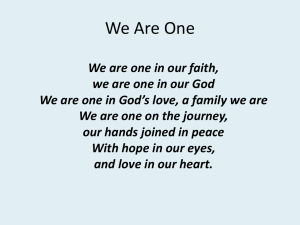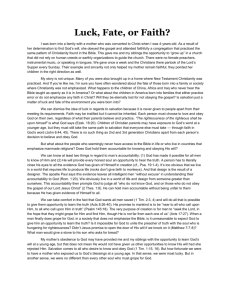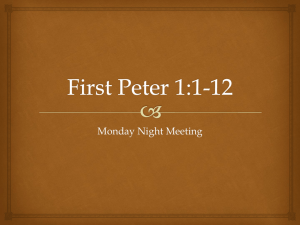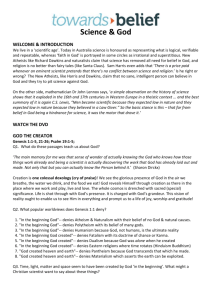SHIFT Sunday Bible Study
advertisement
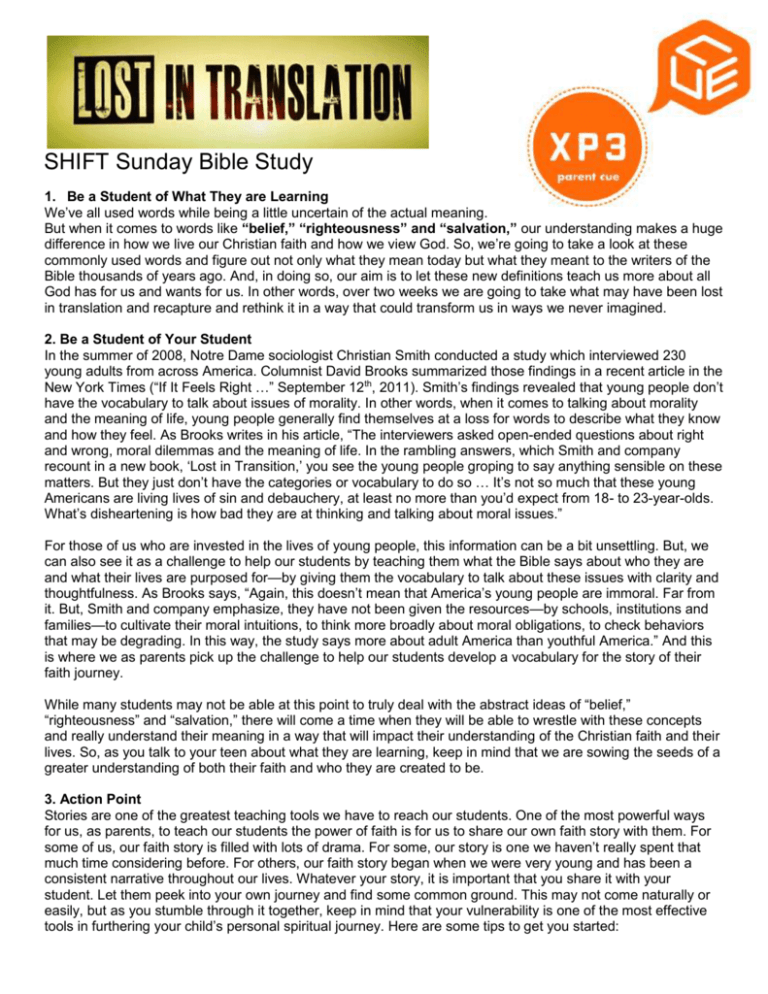
SHIFT Sunday Bible Study 1. Be a Student of What They are Learning We’ve all used words while being a little uncertain of the actual meaning. But when it comes to words like “belief,” “righteousness” and “salvation,” our understanding makes a huge difference in how we live our Christian faith and how we view God. So, we’re going to take a look at these commonly used words and figure out not only what they mean today but what they meant to the writers of the Bible thousands of years ago. And, in doing so, our aim is to let these new definitions teach us more about all God has for us and wants for us. In other words, over two weeks we are going to take what may have been lost in translation and recapture and rethink it in a way that could transform us in ways we never imagined. 2. Be a Student of Your Student In the summer of 2008, Notre Dame sociologist Christian Smith conducted a study which interviewed 230 young adults from across America. Columnist David Brooks summarized those findings in a recent article in the New York Times (“If It Feels Right …” September 12th, 2011). Smith’s findings revealed that young people don’t have the vocabulary to talk about issues of morality. In other words, when it comes to talking about morality and the meaning of life, young people generally find themselves at a loss for words to describe what they know and how they feel. As Brooks writes in his article, “The interviewers asked open-ended questions about right and wrong, moral dilemmas and the meaning of life. In the rambling answers, which Smith and company recount in a new book, ‘Lost in Transition,’ you see the young people groping to say anything sensible on these matters. But they just don’t have the categories or vocabulary to do so … It’s not so much that these young Americans are living lives of sin and debauchery, at least no more than you’d expect from 18- to 23-year-olds. What’s disheartening is how bad they are at thinking and talking about moral issues.” For those of us who are invested in the lives of young people, this information can be a bit unsettling. But, we can also see it as a challenge to help our students by teaching them what the Bible says about who they are and what their lives are purposed for—by giving them the vocabulary to talk about these issues with clarity and thoughtfulness. As Brooks says, “Again, this doesn’t mean that America’s young people are immoral. Far from it. But, Smith and company emphasize, they have not been given the resources—by schools, institutions and families—to cultivate their moral intuitions, to think more broadly about moral obligations, to check behaviors that may be degrading. In this way, the study says more about adult America than youthful America.” And this is where we as parents pick up the challenge to help our students develop a vocabulary for the story of their faith journey. While many students may not be able at this point to truly deal with the abstract ideas of “belief,” “righteousness” and “salvation,” there will come a time when they will be able to wrestle with these concepts and really understand their meaning in a way that will impact their understanding of the Christian faith and their lives. So, as you talk to your teen about what they are learning, keep in mind that we are sowing the seeds of a greater understanding of both their faith and who they are created to be. 3. Action Point Stories are one of the greatest teaching tools we have to reach our students. One of the most powerful ways for us, as parents, to teach our students the power of faith is for us to share our own faith story with them. For some of us, our faith story is filled with lots of drama. For some, our story is one we haven’t really spent that much time considering before. For others, our faith story began when we were very young and has been a consistent narrative throughout our lives. Whatever your story, it is important that you share it with your student. Let them peek into your own journey and find some common ground. This may not come naturally or easily, but as you stumble through it together, keep in mind that your vulnerability is one of the most effective tools in furthering your child’s personal spiritual journey. Here are some tips to get you started: Be sure to do this on your student’s timetable so that they are the most willing to listen and take in what your story has to offer. Pick your teen up from school for lunch or coffee and make a special date out of telling your story. Your student will enjoy the special attention and the break from their normal routine. Find a time when both you and your spouse can share your story in a relaxed environment, such as around the dinner table. Above all, remember that no one has more potential to influence your child’s relationship with God than you do. Being intentional with your student and making time to talk is a valuable resource in building relational trust and walking with your student through their faith journey. Sept 9, 2012 Lesson: Refining the Relationship Bottom Line: Belief is less about confidence in a set of facts and more about a personal experience with the person of Jesus. Scripture References: Luke 22:66-67 1. Can you think of any words you have used that you thought had one meaning but later found out had a completely different meaning? Did it feel weird to try to use that word with its new definition? 2. How would you define the word “belief”? What does the word mean to you? Why do you think that word matters? Does it matter? Why or why not? 3. What are some things you “believe in” and things you “believe” that have nothing to do with your faith? (Example: As little kids we believed in Santa. Because we never had a personal encounter with him we didn’t believe him, or take him at his word. We just believed in his existence. We believe gravity because we have learned about it, but also because we experience it every day.) Sept 16, 2012 Lesson: Save Me? Bottom line: Salvation isn’t just about being saved from an eternity we don’t want, but being saved for something that matters right now. Scripture References: Exodus 15:1-2, Philippians 2:12-13 1. When you’ve heard the word salvation in the past, has it made you feel afraid or nervous? If so, why? 2. How would you define the word “salvation”? Now try to define salvation without using the words “heaven” or “hell.” 3. We said this week that the word salvation comes from the word salve—referring to something that heals. What are some places in your life where you could use a salve? Relationships? Attitude? Behavior at home? EVENTS (CONNECTIONS) Sept 13, 2012 Shift Kick-Off Party Sept 27, 2012 Boys VRS. Girls Night Any questions or concerns please contact: Carleen Koop carleen.koop@brentviewbaptist.com or Daniel Sawyer dan.sawyer@brentviewbaptist.com Or See the Brentview Family Ministry Facebook page or visit www.brentviewfamilies.com
